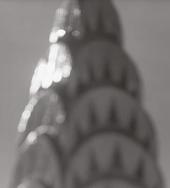
|
Hiroshi Sugimoto: Architecture
Hardback
Main Details
| Title |
Hiroshi Sugimoto: Architecture
|
| Authors and Contributors |
By (author) Hiroshi Sugimoto
|
| Physical Properties |
| Format:Hardback | | Pages:160 | | Dimensions(mm): Height 278,Width 252 |
|
| Category/Genre | Individual photographers
Architecture |
|---|
| ISBN/Barcode |
9788862086585
|
| Classifications | Dewey:779.4092 |
|---|
| Audience | |
|---|
| Illustrations |
90 Illustrations, black and white
|
|
Publishing Details |
| Publisher |
Damiani
|
| Imprint |
Damiani
|
| Publication Date |
3 October 2019 |
| Publication Country |
Italy
|
Description
Known for his long-exposure photographic series of empty movie theaters and driveins, seascapes, museum dioramas, and waxworks, Hiroshi Sugimoto has been turning his camera on international icons of twentieth-century architecture since 1997. His deliberately blurred and seemingly timeless photographs depict structures as diverse as the Empire State Building, Le Corbusier's Chapel de Nutre Dame du Haut, and Tadao Ando's Church of Light in Osaka. The resulting black-and-white photographs, shot distinctly out of focus and from unusual angles, are not attempts at documentation but rather evocation--meant to isolate the buildings from their contexts, allowing them to exist as dreamlike, uninhabited ideals. Among the other buildings represented in the series are Philippe Starck's Asahi Breweries, Fumihiko Maki's Fujisawa Municipal Gymnasium, the United Nations Building, the Chrysler Building, Giuseppi Terragni's Santelia Monument Como, the World Trade Center, Mies van der Rohe's Seagram Building, Antonio Gaud''s Casa Batll* II, the 1922 Schindler House, and buildings by Frank Gehry, Frank Lloyd Wright, and many others in Europe, North America and Asia.
Author Biography
Hiroshi Sugimoto has defined what it means to be a multi-disciplined contemporary artist, blurring the lines between photography, painting, installation, and architecture. His work is held in numerous public collections including The Metropolitan Museum of Art, New York; Museum of Contemporary Art, Tokyo; The National Gallery, London; The National Museum of Modern Art, Tokyo; Smithsonian Institute of Art, Washington, D.C., and Tate, London, among others.
ReviewsHis photographs have stretched and reshaped the concepts of time, space and light endemic to the medium, and in the process they have altered our grasp of history, visual perception and existence itself. He has anointed fossils "the pre-photography time-recording device" and called photography "a process of making fossils out of the present."--Roberta Smith "New York Times"
|